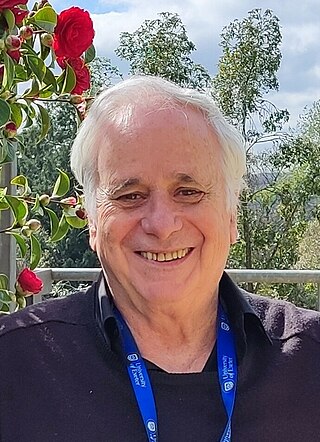
Ashkelon or Ashqelon is a coastal city in the Southern District of Israel on the Mediterranean coast, 50 kilometres (30 mi) south of Tel Aviv, and 13 kilometres (8 mi) north of the border with the Gaza Strip.

The Knesset is the unicameral legislature of Israel.

Ephraim Kishon was a Hungarian-born Israeli author, dramatist, screenwriter, and Oscar-nominated film director. He was one of the most widely read contemporary satirists in Israel, and was also particularly popular in German-speaking countries.

Samuel P. Spiegel was an American independent film producer. Financially responsible for some of the most critically acclaimed motion pictures of the 20th century, Spiegel produced films that won the Academy Award for Best Picture three times, a Hollywood first for a sole independent producer.

The Bene Israel, also referred to as the "Shanivar Teli" or "Native Jew" caste, are a community of Jews in India. It has been suggested that they are the descendants of one of the Ten Lost Tribes via their ancestors who had settled there centuries ago. Starting in the second half of the 18th century, after they were taught about normative Sephardi Judaism, they migrated from villages in the Konkan region where they had previously lived to nearby cities throughout British India—primarily to Mumbai where their first synagogue opened in 1796 but also to Pune, Ahmedabad, and Karachi, where they gained prominent positions within the British colonial government and the Indian Army.

Richard Allen Boone was an American actor who starred in over 50 films and was notable for his roles in Westerns, including his starring role in the television series Have Gun – Will Travel.

The Mediterranean Games is a multi-sport event organised by the International Committee of Mediterranean Games (CIJM). It is held every four years among athletes from countries bordering the Mediterranean Sea in Africa, Asia and Europe. The first Mediterranean Games were held in 1951 in Alexandria, Egypt, while the most recent games were held in 2022 in Oran, Algeria.

Kissufim is a kibbutz in the northwestern Negev desert in Israel. Located adjacent to the Gaza Strip at an altitude of 92 meters above sea level, it falls under the jurisdiction of Eshkol Regional Council. In 2022 it had a population of 294.

Ilan Pappé is an Israeli historian, political scientist, and former politician. He is a professor with the College of Social Sciences and International Studies at the University of Exeter in the United Kingdom, director of the university's European Centre for Palestine Studies, and co-director of the Exeter Centre for Ethno-Political Studies. Pappé was also a board member of the Israeli political party Hadash, and was a candidate on the party list in the 1996 and 1999 Israeli legislative elections.

Gal Gadot is an Israeli actress and model. She portrayed Gisele Yashar in Fast & Furious (2009), a part she reprised in five sequels. Gadot achieved global stardom for her portrayal of Wonder Woman in the DC Extended Universe films (2016–2023), including Batman v Superman: Dawn of Justice (2016), Wonder Woman, Justice League, and Wonder Woman 1984 (2020). She has since starred in the Netflix action-comedy film Red Notice (2021) and the mystery film Death on the Nile (2022). Gadot was included on the list of the 100 most influential people in the world by Time in 2018, and has placed twice in annual rankings of the world's highest-paid actresses.

The ranks in the Israel Defense Forces (IDF) reflect an individual's level in the military.

David and Bathsheba is a 1951 Technicolor epic film produced by 20th Century-Fox and starring Gregory Peck as King David. It was directed by Henry King and produced by Darryl F. Zanuck, with a screenplay by Philip Dunne and cinematography by Leon Shamroy.
This is chronological list of films produced in Israel split by decade. There may be an overlap between Israeli and foreign films which are sometimes co-produced; nevertheless, the lists should attempt to document mainly the Israeli produced films or the films which are strongly associated with the Israeli culture.

The Juggler is a 1953 drama film starring Kirk Douglas as a survivor of the Holocaust. The screenplay was adapted by Michael Blankfort from his novel of the same name. It was the first American feature film that was made in Israel.
Matthew Diamond is an American film and television director, producer and choreographer best known for directing Dancemaker.

Netzer Sereni is a kibbutz in central Israel. Located in the Shephelah between Be'er Ya'akov and Ness Ziona, it falls under the jurisdiction of Gezer Regional Council. In 2022 it had a population of 974.
Events in the year 1951 in Israel.

The Brigand is a 1952 American adventure romance film directed by Phil Karlson and starring Anthony Dexter, Jody Lawrance and Anthony Quinn.
Romanian Jews in Israel refers to the community of Romanian Jews who migrated to Israel beginning in the later 19th century, continued migrating to Israel after the formation of the modern state in 1948, and live within the state of Israel. The descendants of those who made aliyah in the 1930s, the wave of emigrants after World War II or after the fall of communism, with their children and grandchildren born in Israel, represent about 10% of the population. According to the Association of Romanian Journalists Abroad, about 400,000 Romanian Jews live in Israel. They have established several kibbutzim, moshavim and towns. Between 1882 and 1884, Romanian Jews in Israel already established nine localities.















